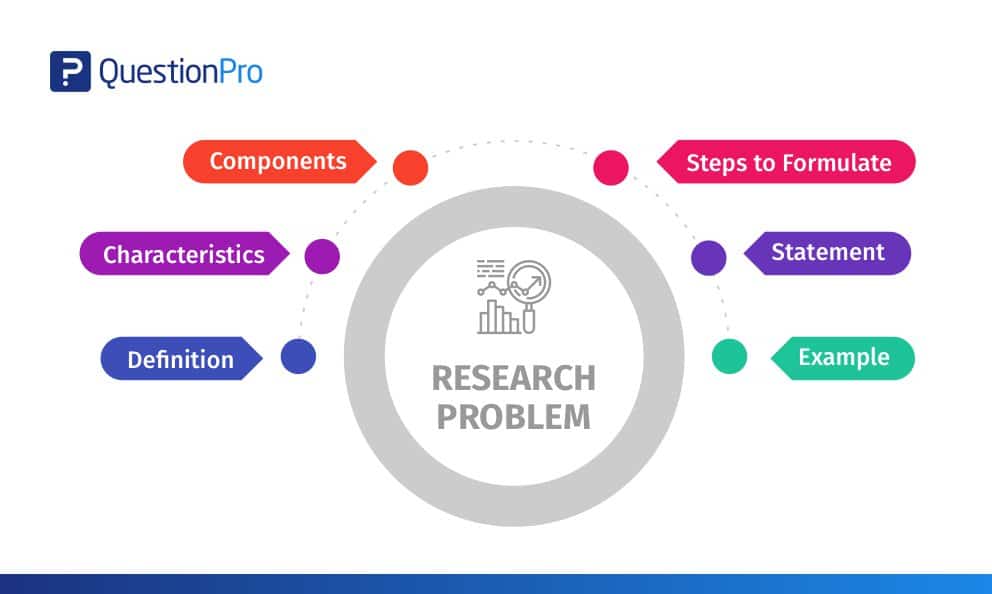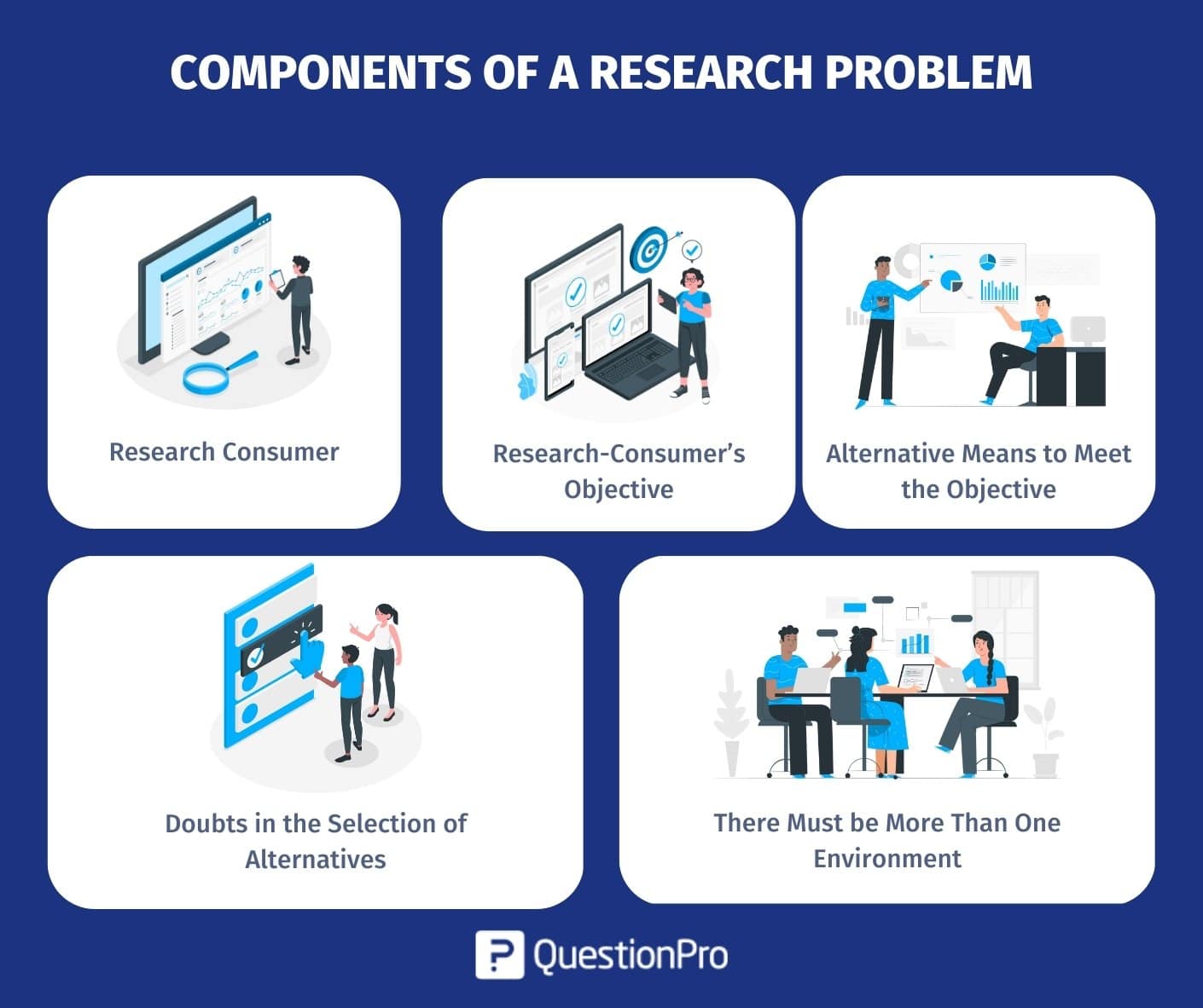
A research process includes several steps that assist individuals involved in a study in conducting successful testing. Defining a research problem is an essential step in any research and can help in outlining your study’s methodology.
In this article, we will define a research problem and go over everything a researcher should know.
What is a research problem?
A research problem is a specific question, problem, or difficulty that needs to be investigated or analyzed.
It is a concise statement that expresses the difference between what is currently known and what needs to be known or the difference between a current situation and a desired state.
Examining research problems helps to identify the key concepts and terms of research. A research problem should be clear, concise, and specific enough to guide the process and contribute to the definition of research project objectives, methods, and outcomes. It is the foundation of any research project, and a well-formulated research problem is required for any research study to be successful.
What is the research problem statement?
A research problem statement is a brief and precise description of the problem that a researcher wishes to investigate. It defines the research’s focus and serves as a framework for developing research questions or hypotheses.
Typically, the problem statement begins with a broad topic or research area and then narrows down to a specific research question or problem. It should explain why the research is important, what gaps in knowledge or understanding exist, and what potential implications or applications the research may have.
A good research statement keeps the researcher focused and guides the research project’s development. It also assists other researchers in comprehending the scope and significance of the research, as well as identifying potential areas for collaboration or further investigation.
What is the purpose of a Research problem statement?
A problem statement in research seeks to achieve the following:
- Introduce the importance of the topic in the research proposal.
- Position the problem in an appropriate and particular context.
- Provide a framework to analyze and report results.
Characteristics of a research problem
Make sure to fulfill these essential characteristics to have an effective research problem. Due to the variety of research, we conduct, it is not possible to inculcate all these characteristics. However, ensure to consider and cover most of these characteristics to enable people to look at, examine, and understand the marketing research problem.
Covers the essential needs or issues
The researcher must have a specific problem statement in the research. Unless you don’t address the crucial issues, the research project will not carry much weight. The complex research project may end up wasting time and money if these issues are not of high importance. Ensure you do not miss out on the more critical needs and concerns to get your marketing strategies right.
The problem is stated logically and clearly
If you can’t state the problem logically or clearly in the research project, the problem likely is a weak one or probably a non-problem. To test this, consolidate the specific problem into a paragraph and ensure it makes sense and covers all the crucial points. Share the problem with others, and if this is not understood by even s few, consider a more logical approach to specify the issue or problem.
The research project is based on actual facts and evidence (non-hypothetical)
There is a difference between beliefs and facts. Keep fiction out of this. Research must be based on actual facts and not beliefs. Hypothetical events will not do the research any good. You can’t consider the research findings true or accurate if you don’t base them on facts and evidence. It must suggest a meaningful and testable hypothesis.
The research problem generates and encourages research questions
The research must create multiple questions. These questions should be more specific to the research that highlights different components or aspects of the problem. These questions must assist in addressing the issue better, providing a robust framework for the research. Formulating such questions is a challenge that needs to be addressed correctly.
It fits the budget and time frame
Ensure that the research activity is doable within the budget and time frame. Consider the logistical factors to ensure successful research. Losing out on the research due to the lack of money and manpower to complete it within a specified timeframe will be a colossal waste of time. Pursue only the problems that are feasible.
Sufficient data can be obtained
Research is based on facts and findings, and there must be multiple cases or findings to prove the research. Research that is based on limited data will do no good to test a theory or satisfy it. If data is unavailable to do research, it does not make sense to go ahead with the research.
The problem has an unsatisfactory answer, or is it a new problem
Ensure that there exists very little or no research on the topic. If the problem already has an existing answer to the problem, and this answer is tried and tested, it’s probably best to move on and not waste time finding what has already been found extensively.
Characteristics of a research problem statement
Here are the characteristics of a research problem statement:
- It must address the gap in knowledge.
- It must be significant to the extent that it contributes positively to the research
- It must help in further research
- The collected empirical data confirm the clarity and understandability of the research problem.
- It must be in the researcher’s interest should and suit his/her time, practical knowledge, research skills, and resources
- The problem-solving approach must be ethical
- Customary research methods can be applied
Components of a research problem
A research problem has the following components:

Research consumer
A group of individuals or various groups of individuals must have difficulty or must face a problem. The researchers may be a part of this group facing the problem. All the others who face the problem but are not included in the research form the research consumers.
Research-consumers objective
The research consumer must face a problem or should need an issue to be addressed. If there is no problem, there can be no basis for conducting research.
Alternative means to meet the objective
Always have a ‘Plan B’ when you address a marketing research problem. It means that the researcher must have at least two means or courses of action to fulfill the research objective. If there is an absence of choice or an alternative means to fulfill the research objective, the researcher cannot have a problem.
Doubts in the selection of alternatives
Having an alternative means to meet the objective is just one part of the problem. Both the means should be such that the researcher has doubts about which is the better approach out of the two. This truly makes the research more reliable.
There must be more than one environment
It is imperative that the problem exists in more than one environment. It can happen that a change in the environmental factors mitigates the problem. A researcher may be doubtful about the most efficient means in the environment ‘A’ but may not be so doubtful about the environment ‘B.’
Steps to formulate a research problem
Here are the five basic steps to formulate a research problem:
Identify the broad research area
Begin your research by identifying a broad research area based on your interest, specialty, profession, expertise, and knowledge. This area must possess some kind of significance regarding your knowledge, interest, and specialty. For example, a researcher studying sports education can select areas like football, soccer, hockey, and baseball. These are the broader areas that can be further subdivided into various research topics to figure out marketing strategies.
Divide the broad area into sub-areas
After you choose a broad area to study, drill down to a specific topic that is manageable and researchable. To do this, break down the broad area into sub-areas and choose a specific research topic. For example, if your broad area is soccer, it can be further divided into the following subcategories:
- Profile of soccer players
- Profile of soccer clubs
- Level of soccer clubs
- Impact of the club on the city
- Revenue generating areas
- Sponsors of the soccer clubs
Choose a sub-area
It is not possible to study all the sub-areas due to time and money constraints. Thus, choose one sub-area of interest and one that is manageable and feasible for you. The area you select must have some research significance and must be significant to your research knowledge.
Formulate research questions
After you choose a specific sub-area, think about the areas you must explore and research. Start noting down important questions that you deem important for the research study. Many questions may arise but narrow down and choose the most important and impactful one. The length of the research depends on the number of questions you formulate. Choose the research question, depending on the expected length of your research.
Set research objectives
You must draw a plan about the objectives of the research that you need to explore. The smart objectives of the research study help to identify the research question. There is a difference between the research question and the research objective. The difference is the way they are written. Research questions generally consist of an interrogative tone. On the other hand, the research objectives are aim-oriented. They include terms like examining, investigating, exploring, and finding out.
Marketing research problem example
Organizations and companies use marketing research problems to gauge the risks associated with launching a new product or service. They do not wish to spend money expanding a product line where research shows it will not succeed. A well-designed, well-executed marketing research study helps in identifying customer interests, consumer tastes, and preferences to help with decisions around the product or service.
Research problem statement example
A research question is the most important aspect of the research. You must spend time refining and assessing the research questions before getting started with the research activities. A research question must be straightforward, to the point, focused, and appropriately complex to capture the most relevant information.
Having difficulty writing research problems? Follow these examples to write a problem statement:
Incorrect: What are the effects of social media on people?
Correct: What effect does use Facebook every day have on teenagers?
In the above example, the first research question is not specific enough to capture accurate feedback. Nobody knows what social media you’re talking about and what ‘people’ you’re referring to.
Let’s look at another marketing research problem example.
Incorrect: Who has a better healthcare system? The US or the UK?
Correct: How do low-income earning people feel about the healthcare system, and how do the UK and the US compare?
The next research question is comprehensive and does not draw a definite conclusion about the healthcare systems of both countries.
The third example of how to write a problem statement is:
Incorrect: What will help political parties address the issues of low voter turnout?
Correct: What communication strategies can political parties apply to increase voter turnout among people between the age of 25-30?
Again, comparing both statements, the second one is more direct and implies only a specific group of people, thus collecting actionable information.
Extensive research problem software, platform, and tool
Formulating a marketing research problem is just one crucial part of the research process. Another essential aspect of marketing research is using a robust market research software tool that aids in your research activity.
For example, The Research methods knowledge base is a comprehensive web-based textbook that covers all the topics in a typical introductory undergraduate or graduate social research methods course. It covers the research question, measurement (surveys, scaling, qualitative, unobtrusive), research design (experimental and quasi-experimental research), data analysis, and writing the research paper.
You can do a whole lot by choosing the right research platform to solve a specific problem. By using a research repository, you can mitigate the need to think of research and a research problem as a decentralized process in your organization.
Top seven benefits of using a robust research software
Here are the benefits of using a robust research software tool
Powerful and efficient market research
You can collect actionable data from market research that aids in making accurate decisions.
Professional grade
Professional grade tools come with a host of survey features and research question that helps you probe your audience in detail.
Powerful survey logic
Data accuracy is vital to make decisions – both big and small. A good research design with powerful survey logic like branching and skip logic helps you pose the right research question to the right audience.
Collect unbiased data
Data, if biased, will lead to failure in decision-making. It is necessary to capture unbiased data to make efficient decisions.
Data analysis
Why spend time manually analyzing data when you can automate the process from within the tool? A good survey platform provides accurate data analysis that helps in decision-making.
Advanced analysis techniques
Take your research a step forward with a powerful suite of techniques like maxdiff analysis, conjoint analysis, TURF analysis, and heatmap analysis.
Uncover brand insights
Acquire insights that your brand needs to excel in. Gather honest feedback that will help you drive your business to the next level.
Advantages of formulating a research problem
Here are the advantages of formulating a research problem:
Understanding the research procedure
Writing research problems helps in a more comprehensive understanding of the research procedure in a better way. Many researchers think that formulating a research problem is simple, but that is not true. The researcher needs to put a lot of effort into creating a specific problem and then understand the research procedure.
Determining the research objective
A research problem helps to understand the intention and goals of the research. The methodology cannot be defined without a clear research problem.
Design the research process
A research problem helps you identify the approach you must take for the research activity. It helps in the identification of each step you must take to do your research – the sampling strategy, the research design, the research analysis, and the research instruments to be used.
Lays the foundation for research
Formulating a good research problem is compared to laying the foundation of a building. If the research problem is well-identified, you will face fewer hiccups during the research process.
How QuestionPro helps researchers solve research problems?
QuestionPro provides a number of tools and features to assist researchers in solving research problems, including:
- Survey creation: QuestionPro offers to skip logic, branching, randomization, and a range of research question types.
- Data Collection: QuestionPro lets researchers collect data through email, social media, and embedded surveys on websites.
- Real-time Data Analytics: QuestionPro’s real-time data analytics solutions help researchers solve research issues. Researchers may quickly spot patterns and make data-driven decisions using the platform’s strong analytics tools.
- Collaboration: Researchers can invite team members to surveys and exchange data and analytic results, making collaboration and task completion easy with QuestionPro.
- Integration with Other Tools: QuestionPro integrates with a variety of other tools, including Salesforce, Hubspot, and Google Analytics.
QuestionPro provides a comprehensive set of research tools to assist researchers in solving research problems. QuestionPro provides a complete solution that can help researchers tackle their research problems with ease, from survey creation to data collection, real-time data analytics, collaboration, and integration with other tools. Contact QuestionPro right away to get the best value for your research process!







